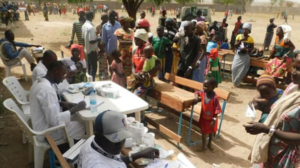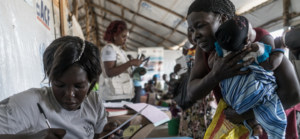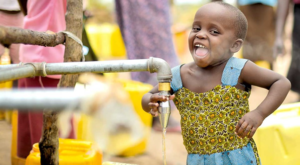

Sub-Saharan Africa hosts more than 26 per cent of the world’s refugee population.
Over 18 million people in this region are of concern to UNHCR. That number has soared in recent years, partly due to ongoing crises in the Central African Republic (CAR), Nigeria and South Sudan. It has also grown because of new conflicts erupting in Burundi and Libya. These families are fleeing for their lives and desperately seeking refuge. If you’re like us, you believe that everyone deserves a place to call ‘home’. You believe that families and young children deserve safety and security. And you want to do something to help.

We work with local partners to meet refugees at their first point of safety, providing emergency aid to families living in temporary shelters – including clean water, food, hygiene kits and other essential items.

As refugee families realize they may never return home, they often face an overwhelming loss of hope. Alongside local partners, we work to combat this by providing trauma counselling, mother and parent groups, and safe spaces and literacy clubs for refugee children to learn, grow and play.

As refugees begin to rebuild their homes and lives, we help families find housing, learn new language, pursue employment, build friendships and create long-term support systems.
Understanding Our Relief and Development Work

Many of us in Africa are hypocrites, especially our leaders! Every one of them will tell you that they believe in the vision of Agenda 2063 and the Pan-African dream of a borderless united Africa! But many of our leaders will go to the last mile to shut down their borders and prevent fellow Africans from coming in to seek jobs. Every known obstacle (legal and illegal) will be put up to prevent unwanted Africans. Did you that in many African states, hundreds of thousands of their citizens, born and raised up in their towns and villages are stateless, denied citizenships? What hypocrisy and nonsense. It’s time we call things by their proper names.
We are an organisation that rolls up our sleeves and gets to work.
Did you know that hundreds of millions of your fellow Africans live in poverty and go to bed hungry every day? Imagine the fate of refugees! Working through our connections in and around Africa, we start by listening to the needs of our neighbours and getting their ideas to help break the cycle of hunger and poverty. Then we partner with them to make their dreams and hopes a reality. From health clinics to microloans, bore holes, to animal husbandry, food pantries to soup kitchens, we work together with refugees to support innovative solutions that get at the root causes of hunger and poverty, and the extended poverty challenges of our communities.
AU Watch has a long history of being present in communities, working to help and serve where the needs are greatest. We are compelled to be attentive to the complex and changing situations of stateless Africans, refugees, asylum seekers, IDPs and migrants. Our position is a simple one: Africans have a right to move and settle anywhere and in any place of their choosing in Africa. At AU Watch we believe it is an inalienable right as part of the vision of a united Africa.
Each effort strives for justice, peace and change in the world, and draws its strength and effectiveness from working in partnership with others who share a common vision of serving and loving our neighbour and restoring and reconciling communities in the name of Pan-Africanism
What We Do
 We are big on education. We are leading campaigns to change the entire structure of education curriculums and syllabuses in Africa. As you probably know, education is often the first service to disappear in emergencies and the last to be resumed. Crises are lasting entire generations, and millions of children affected by them need immediate educational support. There are millions of teenagers growing up as illiterates – with no knowledge, no skills and very angry. Girls, children with disabilities, and refugees have even greater barriers to accessing education. This is unacceptable!
We are big on education. We are leading campaigns to change the entire structure of education curriculums and syllabuses in Africa. As you probably know, education is often the first service to disappear in emergencies and the last to be resumed. Crises are lasting entire generations, and millions of children affected by them need immediate educational support. There are millions of teenagers growing up as illiterates – with no knowledge, no skills and very angry. Girls, children with disabilities, and refugees have even greater barriers to accessing education. This is unacceptable!
Access to Schooling: All children have the right to access and complete a full course of education opportunities. We build schools. Where we are not able to do so, we support and equip schools. We are campaigning for all children to have access to good quality education all over Africa. To promote sustainability, AU Watch trains educators and tailors curriculum to meet students’ needs. We teach valuable life skills geared towards finding employment, such as middle level practical skills (carpentry, tailoring and masonry), computer skills, accounting, and financial literacy.
For more information, please click the following threads →.
 Creating jobs:
Creating jobs:
To achieve the most lasting development in fragile settings, one intervention is more powerful than all the rest: creating jobs. More than anything else, people who are displaced just want to find a job to take care of their families. Our programs are based on sustainable, enterprise-oriented solutions. We help small producers and other entrepreneurs build businesses that transform their communities, create quality jobs, and increase productivity, market opportunities, and incomes. We do this by expanding access to small-scale technologies that are appropriate for fragile settings, as well as providing technical assistance, knowledge, and financial support.
 Wash program
Wash program
We are now developing our water, sanitation, and hygiene (WASH) programs.
Please stay tuned for more information on our relief & development work. But explore some of projects here →.
Generation 2063 Schools and Education Programs
Project No Child Left Behind
Did you know that there are over 30,000,000 children of primary school age that do not attend school in Sub-Saharan Africa? Add that to the over 90,000,000 from ages12-18 and you see the scale of the problem. That is more than the combined population of Senegal, The Gambia, Sierra Leone, Liberia, and Cape Verde. Three fourths of those who do go to school are being taught by unqualified teachers. AU Watch’s own figures reveal that 93 percent of the schools in West Africa are poorly equipped with sub-standard buildings or outright dangerous buildings and 98 percent have little or no recreational facilities for children. As if matters could not get any worse, AU Watch research shows that in many schools in West Africa, it is not uncommon for children to be taught under the shade of a mango or baobab tree. Click here for more information
AU Watch ‘Project Africa Education Portal’
Why should it be the case that whenever we need reliable statistics or information on basically anything in Africa, it must come from the West or one of the UN agencies? In the case of education reliable statistics and information are patchy or quite difficult to get. Worse case scenarios are that many governments across the region massage figures or are simply too busy robbing from the people to care enough to collate up-to-date reliable information. There are many countries in the region that have no accurate figures, and absolutely no idea how many children are not in school. But how will they have – many of these countries have no accurate records of births and deaths and infant and child mortalities. Many of these figures are estimates derived from many sources. Many of the schools in these countries are staffed by ghost teachers and teachers without proper qualifications. How many countries (especially in sub-Saharan Africa) have reliable figures of unemployment (disaggregated) rates in their countries? If the figures they have cannot be relied upon, how then can a government plan properly for its people when it does not have dependable information to guide its budgeting and programs?. Click here for more information
AU Watch “Project Build, Develop and Equip Schools
How on earth do we (yes you and us)! achieve this gigantic task of ensuring that every child is in school in the next twenty years, and that every African can read and write by 2063? As you know, most of our schools, are dilapidated, poorly equipped and poorly staffed. But let’s be honest with ourselves, don’t you think, the monies being stolen from us or mismanaged by our politicians, big business and is more than enough to enrol all our children in school? Do you think it is right for your own children to be in school, whilst those he or she will play with after schools are not? How in God’s name can it be right for you to be going shopping with your children in the evening for their breakfast and school lunch, whilst other children his or her age are out in parking lot begging from the pennies your child may not have spent inside the supermarket? . Click here for more information
Literacy Is a Human Right
AU Watch believes that education is the key to the future of Africa. Too many of our youths cannot read and write. The project will work to achieve universal reading, writing and IT proficiency for all our youths. This includes helping them to engage solidly with the Fourth Industrial Revolution that is now with us. We are exploring ways to achieve such goals, like establishing libraries, reading clubs / books clubs all over the continent and offer every student the hands-on computer science and math classes that make them job-ready on day one. . Click here for more information
Financing and other commitments are falling short
Many factors contribute to limiting access to school and excluding children from a proper education including corruption, poverty, poor health and nutrition, disability, gender, ethnicity, child labour, migration, geographical disadvantages, cultural factors, and situations of fragility and conflict. Click here for more information
Other Projects You May Be Interested In
We care About Human Rights: Climate change and human rights – we care about them both, but we often think of them separately. We usually associate violations of human rights with brutal regimes, but climate change is just as brutal and unjustified. Nothing can be more inhumane than man-created famine. As temperatures rise, extreme weather events are becoming more frequent and more severe. Farmers are struggling to cope. It is the worst form of violation, as nearly a billion of the world’s poorest people – people who did the least to cause climate change . Click here for more information